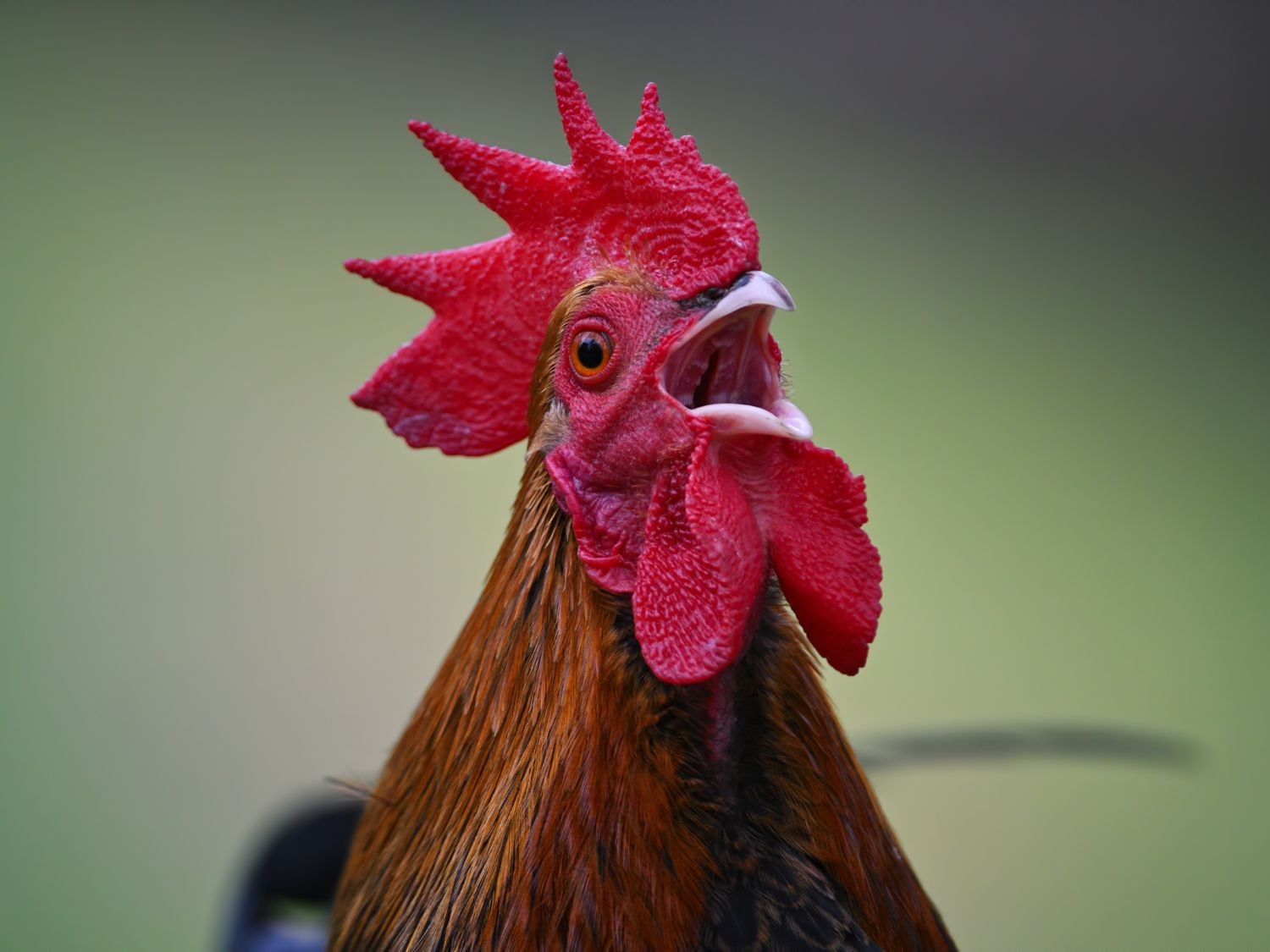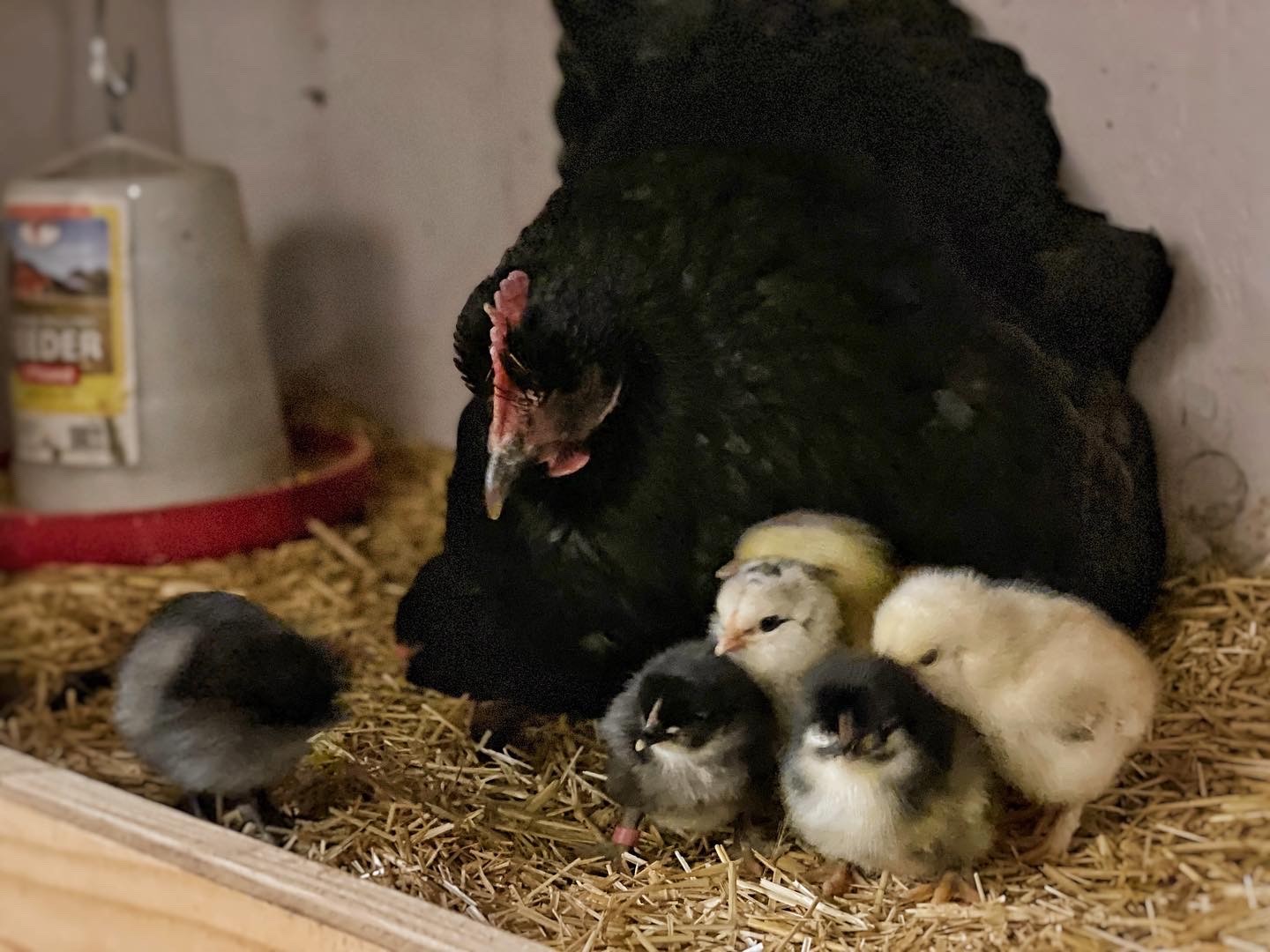Are Chickens Loud Pets? Discovering the delightful world of chicken keeping often begins with this important question. At PETS.EDU.VN, we understand that prospective chicken owners want to be well-prepared for the realities of backyard poultry, including the sounds they make. Explore various noises chickens produce, and find solutions for a harmonious homestead.
Discover how to manage chicken sounds and what to expect as a chicken keeper. PETS.EDU.VN helps you navigate chicken communication, flock management, and breed selection.
1. Decoding Chicken Noises: A Comprehensive Guide
Chickens communicate through a variety of sounds, each with its own meaning. Understanding these sounds can help you better care for your flock and address any potential issues. Let’s explore the different types of noises you might encounter:
1.1. Rooster Crowing: The Sound of Dawn (and Beyond)
Roosters are notorious for their loud crowing. This iconic sound serves several purposes:
- Territorial Announcement: Crowing is a rooster’s way of declaring his territory and warning other roosters to stay away.
- Attracting Mates: Crowing also serves to attract hens and establish the rooster’s dominance within the flock.
- Signaling the Day: Traditionally, roosters crow at dawn, signaling the start of a new day. However, they may also crow throughout the day for other reasons.
The loudness of a rooster’s crow can vary depending on the breed and individual bird, but it can often reach up to 90 decibels. In urban environments, this can be a source of conflict with neighbors. Before getting a rooster, consider local ordinances and the proximity of your neighbors.
1.2. Hen Chatter: Everyday Chicken Conversations
Hens are not silent creatures, but their typical “chatter” is usually much quieter than a rooster’s crow. This chatter consists of soft clucking, purring, and murmuring sounds. This low-level noise is often associated with:
- Social Interaction: Hens communicate with each other to establish a pecking order, share information about food, and maintain social bonds.
- Comfort and Contentment: Happy, relaxed hens often make soft, contented noises.
- Pre-Laying Behavior: Before laying an egg, hens may become more vocal, making a series of clucking sounds.
1.3. The Egg Song: A Hen’s Proud Announcement
The “egg song” is a unique vocalization that hens make after laying an egg. This sound is a loud, repetitive cackle that can last for several minutes. The egg song seems to function as:
- Announcement: It’s the hen’s way of announcing to the world that she has laid an egg.
- Distraction: It may also serve to distract predators from the nest.
- Social Bonding: Other hens in the flock may join in the egg song, creating a chorus of cackling.
1.4. Alarm Calls: Warning Signals of Danger
Chickens are vigilant creatures and are quick to sound the alarm when they perceive a threat. Alarm calls are loud, high-pitched vocalizations that alert the entire flock to potential danger. There are distinct alarm calls for:
- Aerial Predators: Hawks, eagles, and other birds of prey trigger high-pitched alarm calls that cause the chickens to seek cover.
- Ground Predators: Foxes, coyotes, dogs, and other ground predators elicit lower-pitched alarm calls that prompt the chickens to group together and defend themselves.
1.5. Broody Hen Sounds: Maternal Communication
When a hen becomes broody, meaning she wants to hatch eggs, she makes a variety of unique sounds:
- Growling: A broody hen will often growl or hiss at anyone who approaches her nest, warning them to stay away from her eggs.
- Clucking: She uses a soft, repetitive clucking sound to communicate with her chicks, both before and after they hatch.
1.6. Chick Noises: The Sounds of New Life
Baby chicks are surprisingly vocal. Their noises can indicate their needs and emotional state:
- Peeping: Chicks peep to communicate with their mother hen and other chicks.
- Distress Calls: If chicks are cold, hungry, or lost, they will emit loud, shrill distress calls.
- Contented Noises: When chicks are warm, fed, and secure, they will make soft, contented chirping sounds.
1.7. Dispute Squawks: Chicken Conflicts
Chickens sometimes squabble, expressing their disputes through squawking. These arguments often arise over:
- Nesting Boxes: Competition for the best nesting spot can lead to noisy disputes.
- Treats: The discovery of a tasty treat can spark a squabble as chickens compete for it.
- Roosting Spots: Chickens may argue over their preferred roosting location.
Providing ample resources can minimize conflict-related squawking.
2. Quiet Chicken Breeds: Minimizing the Noise
While all chickens make some noise, certain breeds are known for being quieter than others. If noise is a major concern, consider these breeds:
2.1. Gentle Giants: Large, Docile Breeds
Large, docile breeds tend to be calmer and less vocal:
- Brahma: Known for their gentle nature and quiet demeanor.
- Cochin: Docile and friendly, Cochins are a good choice for backyard flocks.
- Orpington: Orpingtons are known for their calm temperament and relatively quiet nature.
2.2. The Calm and Collected: Medium-Sized Breeds
Several medium-sized breeds are also known for their quietness:
- Barred Rock: A popular breed known for its docile temperament and moderate noise level.
- Plymouth Rock: Similar to Barred Rocks, Plymouth Rocks are generally quiet and easy to manage.
- Wyandotte: Wyandottes are known for their hardiness and relatively quiet nature.
- Rhode Island Red: Can be talkative but generally manageable with proper care.
- Silkie: These are known for their fluffy plumage and gentle, quiet nature.
2.3. Breeds to Avoid: The More Vocal Varieties
Some breeds are known for being more vocal and active:
- Leghorn: Leghorns are active and noisy, making them less suitable for urban environments.
- Ancona: Anconas are known for their flighty and vocal nature.
- Andalusian: Similar to Anconas, Andalusians are active and can be quite noisy.
Table: Quietest Chicken Breeds and Their Characteristics
| Breed | Size | Temperament | Noise Level | Notes |
|---|---|---|---|---|
| Brahma | Large | Docile | Low | Known for gentle nature. |
| Cochin | Large | Docile | Low | Friendly and good for backyard flocks. |
| Orpington | Large | Calm | Low | Known for their calm temperament. |
| Barred Rock | Medium | Docile | Moderate | Popular and manageable. |
| Plymouth Rock | Medium | Docile | Moderate | Similar to Barred Rocks. |
| Wyandotte | Medium | Hardy | Moderate | Known for their hardiness. |
| Rhode Island Red | Medium | Can be talkative | Moderate | Manageable with proper care. |
| Silkie | Small | Gentle | Low | Fluffy plumage and gentle nature. |



3. Practical Tips for Reducing Chicken Noise
Even with quiet breeds, there are several steps you can take to minimize noise:
3.1. Coop Placement: Strategic Positioning
Careful coop placement can significantly reduce noise:
- Distance from Neighbors: Position the coop as far away from neighboring properties as possible.
- Natural Barriers: Use natural barriers like hills, trees, or sheds to block sound.
- Avoid Windows Facing Neighbors: Omit windows on the side of the coop facing your neighbor’s property.
3.2. Coop Design and Insulation: Soundproofing Measures
Coop design and insulation can further dampen chicken noise:
- Solid Walls: Use solid, tightly sealed walls to contain sound.
- Insulation: Insulate the walls and roof of the coop with materials like fiberglass, foam board, or recycled denim.
- Heavy Door: A heavy, solid door can help block sound from escaping the coop.
3.3. Adequate Space: Happy Chickens, Quiet Chickens
Providing adequate space is essential for reducing stress and noise:
- Coop Space: Provide at least 4 square feet of coop space per chicken.
- Run Space: Offer at least 8-10 square feet of run space per chicken.
- Nesting Boxes: Provide one nesting box for every 4-5 hens to reduce competition and squabbling.
- Roosting Bars: Ensure ample roosting space to prevent conflicts over sleeping arrangements.
3.4. Predator-Proofing: Minimizing Alarms
Protecting your chickens from predators is crucial for their well-being and can also reduce noise:
- Secure Coop: Build a sturdy coop with a secure roof, walls, and floor.
- Hardware Cloth: Use hardware cloth instead of chicken wire to enclose the run.
- Buried Fencing: Bury hardware cloth around the perimeter of the run to prevent digging predators.
- Secure Doors: Use secure latches and locks on all doors and gates.
3.5. Routine and Consistency: A Predictable Environment
Chickens thrive on routine and consistency. A predictable environment can reduce stress and noise:
- Regular Feeding Schedule: Feed your chickens at the same time each day.
- Consistent Bedtime: Encourage your chickens to go to roost at the same time each night.
- Minimize Changes: Avoid making sudden changes to their environment or routine.
3.6. Addressing Boredom: Preventing Problem Behavior
Boredom can lead to destructive behaviors and increased noise levels. Provide enrichment activities to keep your chickens occupied:
- Dust Bathing Area: Provide a designated area for dust bathing.
- Perches and Swings: Add perches and swings to the run for climbing and entertainment.
- Treats and Foraging: Scatter treats in the run to encourage foraging behavior.
3.7. Managing Rooster Crowing: Strategies for Minimization
If you keep a rooster, there are some additional steps you can take to manage his crowing:
- Crow Collar: A crow collar restricts airflow, reducing the volume of the crow.
- Dark Coop: Keeping the coop dark in the morning can delay crowing.
- Strategic Placement: Place the coop in an area where the crowing will be less disruptive.
3.8. Friendly Communication: Building Neighborly Relations
Open communication with your neighbors can go a long way in preventing conflicts:
- Discuss Your Plans: Talk to your neighbors before getting chickens.
- Address Concerns: Be open to addressing their concerns about noise or other issues.
- Offer Eggs: Sharing fresh eggs is a great way to build goodwill.
Table: Strategies to Reduce Chicken Noise
| Strategy | Description | Benefits |
|---|---|---|
| Coop Placement | Position coop away from neighbors, using natural barriers. | Reduces direct sound transmission to neighboring properties. |
| Coop Insulation | Use solid walls and insulation materials. | Dampens and contains noise within the coop. |
| Adequate Space | Provide sufficient coop and run space per chicken. | Reduces stress and conflicts, leading to quieter chickens. |
| Predator-Proofing | Secure the coop and run to prevent predator attacks. | Minimizes alarm calls caused by predator threats. |
| Routine Consistency | Maintain a consistent feeding and bedtime schedule. | Provides a predictable environment, reducing stress and noise. |
| Enrichment Activities | Offer dust bathing areas, perches, and foraging opportunities. | Prevents boredom and destructive behaviors. |
| Crow Collar (Roosters) | Restricts airflow to reduce the volume of crowing. | Decreases the loudness of rooster crows. |
| Dark Coop (Roosters) | Keeping the coop dark in the morning can delay crowing. | Delays and reduces the frequency of rooster crows. |
| Neighbor Communication | Discuss plans with neighbors and address their concerns. | Builds goodwill and prevents conflicts. |
4. Understanding Local Ordinances: Legal Considerations
Before acquiring chickens, it’s essential to research and comply with local ordinances regarding poultry keeping. These regulations may address:
- Rooster Restrictions: Many municipalities prohibit or restrict the keeping of roosters due to noise concerns.
- Number of Chickens: There may be limits on the number of chickens allowed per property.
- Coop Setbacks: Ordinances may specify how far the coop must be located from property lines or dwellings.
- Noise Restrictions: Some areas have specific noise ordinances that could apply to chickens.
Failure to comply with local ordinances can result in fines or legal action.
5. Chicken Noise at Night: What to Expect
Chickens are generally quiet at night. Once they go to roost, they typically remain still and silent until morning. However, there are a few exceptions:
- Disturbances: Loud noises, predators, or other disturbances can startle chickens and cause them to make noise at night.
- Illness or Injury: A sick or injured chicken may vocalize at night.
- New Flock Members: Introducing new chickens to the flock can disrupt their sleep and cause them to make noise.
If your chickens are making excessive noise at night, investigate the cause and address any underlying issues.
6. Addressing Noise Complaints: Conflict Resolution
Despite your best efforts, you may still receive noise complaints from neighbors. Here are some tips for handling these situations:
- Listen to Their Concerns: Take the time to listen to your neighbor’s complaints and understand their perspective.
- Acknowledge Their Feelings: Acknowledge that their concerns are valid and that you are taking them seriously.
- Offer Solutions: Propose solutions to address the noise issue, such as improving coop insulation or reducing the number of chickens.
- Compromise: Be willing to compromise to find a solution that works for everyone.
- Mediation: If you are unable to resolve the issue on your own, consider seeking mediation from a neutral third party.
Remember, maintaining good relationships with your neighbors is essential for successful backyard chicken keeping.
7. The Benefits of Chickens: Worth the Noise?
Despite the potential for noise, there are many benefits to keeping chickens:
- Fresh Eggs: Chickens provide a steady supply of fresh, nutritious eggs.
- Pest Control: Chickens eat insects and other pests, helping to control their populations in your yard.
- Garden Enrichment: Chicken manure is a valuable fertilizer for gardens.
- Companionship: Chickens can be entertaining and rewarding pets.
- Educational Value: Raising chickens can be a valuable learning experience for children and adults alike.
For many people, the benefits of keeping chickens outweigh the potential for noise.
8. Integrating Chickens into Urban and Suburban Settings
Chickens can be successfully integrated into urban and suburban settings with careful planning and management. By selecting quiet breeds, implementing noise-reduction strategies, and maintaining good relationships with neighbors, you can enjoy the benefits of backyard chickens without causing conflicts.
9. Expert Insights on Chicken Sounds: Q&A with PETS.EDU.VN
To provide further insights, PETS.EDU.VN addresses common questions about chicken sounds.
9.1. What is the loudest noise a chicken makes?
The loudest noise a chicken makes is typically the rooster’s crow, which can reach up to 90 decibels.
9.2. Do hens make noise all day?
Hens do not make noise constantly, but they can be vocal throughout the day, especially when communicating with each other or laying eggs.
9.3. Are certain chicken breeds quieter than others?
Yes, breeds like Brahmas, Cochins, and Orpingtons are known to be quieter than breeds like Leghorns and Anconas.
9.4. How can I reduce noise from my chickens?
You can reduce noise by selecting quiet breeds, providing adequate space, predator-proofing the coop, and implementing noise-reduction strategies like coop insulation.
9.5. Are chickens noisy at night?
Chickens are generally quiet at night unless they are disturbed by predators or other factors.
9.6. What should I do if my neighbors complain about chicken noise?
Listen to their concerns, offer solutions, and be willing to compromise to find a resolution.
9.7. How close to my neighbor’s property can I keep chickens?
Check your local ordinances for specific setback requirements.
9.8. Do crow collars hurt roosters?
When applied correctly, crow collars do not hurt roosters, but it’s essential to monitor the rooster and ensure the collar is not too tight.
9.9. What are the benefits of keeping chickens in my backyard?
Benefits include fresh eggs, pest control, garden enrichment, companionship, and educational value.
9.10. Can I keep chickens in an urban area?
Yes, but it’s essential to check local ordinances and take steps to minimize noise and odor.
10. Explore Further with PETS.EDU.VN
Discover more about chicken breeds, coop designs, and expert tips for raising happy and healthy chickens:
- Chicken Breed Guide: Explore detailed profiles of various chicken breeds, including their temperament, egg-laying ability, and noise level.
- Coop Design Plans: Access a variety of coop design plans to create a comfortable and secure home for your chickens.
- Expert Advice: Get expert advice on all aspects of chicken keeping, from feeding and health to behavior and management.
Visit PETS.EDU.VN today to unlock a wealth of information and resources for successful backyard chicken keeping.
Are chickens loud pets? With the right knowledge and preparation, you can create a harmonious environment for both you and your feathered friends. Discover the joys of chicken keeping with confidence!
Need more advice or services? Contact us at 789 Paw Lane, Petville, CA 91234, United States. Whatsapp: +1 555-987-6543 or visit our website at pets.edu.vn for more information.